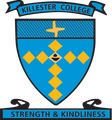Wellbeing

Dear Parents and Friends,
This week we finally celebrate the return of all students and the end of remote teaching and learning. For us all, it really feels like we are starting the year again. Teachers, students and families have all experienced moments of mixed emotions – anxiety, worry and gratitude. Upon return to school, each year level conducted check-in and reflection sessions to help students settle. The one question we asked students, with almost unanimous response, was “What did you miss the most during the school closure?” The student response was “Friends”. Even with the availability of internet and social media the value of daily contact with your community cannot be replaced. Watching the students smile and greet their friends and waving to parents as they dropped off their daughters gave all staff the joy and energy to continue the work, we do each day.
“Friendship” is such a vital element of a young person’s development and one of the major reasons students look forward to coming to school. Of course, if students develop good relationships with their teachers and they enjoy connecting with their friends it naturally follows that they will learn. Positive connections with teachers and friends supports the development of vital life skills such as encouragement, motivation, managing stress, honesty, self-esteem, sharing and acceptance.
Of course, during this time not all students return to school with a sense of joy and relief. Some students may experience worry and anxiety. It may relate to schoolwork or it may relate to re-connecting with their teachers and friends. This advice from Michael Grose – Parenting Ideas, offers some insights relating to what your daughter may be feeling and how you can support her to settle back into Killester life:
Going back to school after the enforced COVID-19 break is a source of mixed emotions for many children and young people. Some students, who revel in face-to-face interactions, just can’t wait to reconnect with friends and teachers. Others who have appreciated the break from constantly being emotionally switched on when at school may be reticent to return.
Park your expectations
School undoubtedly will be a different experience for students post COVID-19. It may require you to adjust your expectations, particularly academically, so patience is definitely required. Education is a long game, so if you are worried about your child missing the educational beat, recognise that this experience has been a blip on the educational curve. It’s worth remembering that anxiety loves company. Park your expectations for a time, so your daughter won’t pick up your anxieties.
Understand that their anxiety is real
An anxious child desperately wants a parent to understand that they feel anxious and apprehensive. Even if, you can’t comprehend the impact that a return to school has on their state of mind and physiology, recognise that their anxiety is real. “Ah, I see you’re worried that you won’t know what to do when you go to school” is the type of response that an anxious child wants from a parent. Validating your daughter’s feelings will help them feel safe and secure, putting them in a good position to make a return to school. “Mum/dad know that I’m feeling nervous” is very reassuring for a young person.
Prepare them
Worriers and anxious types in particular, like to know what’s ahead. Prepare your daughter for a return by discussing the safety procedures the school will be implementing. Ask your daughter what they are looking forward to and check in with how they are feeling about a return. Check in regularly with how they are feeling and correct any misconceptions.
Focus on re-connection
Make re-connection the theme for your daughter’s return to school. She will have to reconnect with friends, teachers and learning, which takes time. In all likelihood, your daughter’s teachers will use many strategies to help your daughter connect with their friends, reflect on their time at home and move them back into full-time learning mode. Support these activities and reassure your daughter that they’ll feel comfortable very soon with their school experience.
Stay off the roundabout for a while
This period will mirror the start of the school year when your daughter had to adjust to new teachers, different classmates and a new year level. Adjusting to change takes a great deal of personal energy, so your young person may become tired, grumpy, even moody at home. Make allowances for these personal changes and make sure they have plenty of free time to unwind after school to relax.
Take care of yourself
In recent months parents and teachers have been doing significant emotional labour. The learning and adjustment curves have been massive, with little time to relax and take a break. Consider your own emotional resources and make your well-being a priority, which will make it easier for you to stay calm if your daughter experiences difficulties.
The COVID-19 pandemic has thrown many difficulties, requiring us all to quickly adapt to new situations. Flexibility is a prime characteristic of resilient people, so if nothing else, getting through these times will make us all more resilient.
Wishing all families, a peaceful transition back to school. If you have any concerns relating to your daughter, please don’t hesitate to contact your daughter’s Homeroom Teacher or Student Development Leader.
Regards
Luana Doko
Welfare Coordinator
